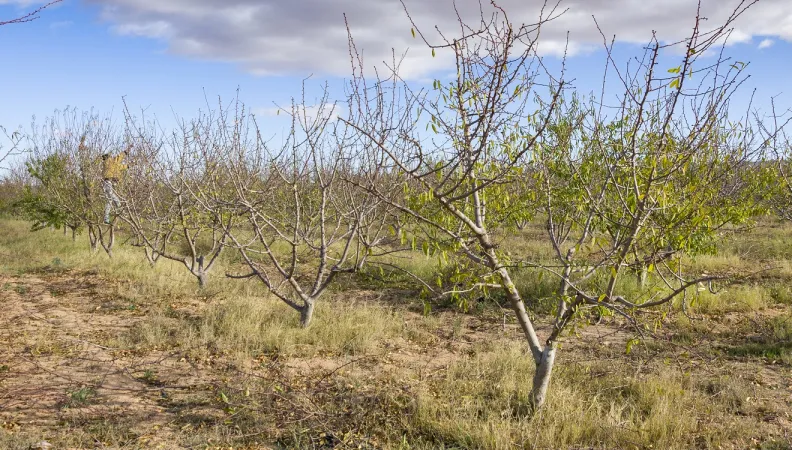Share the page
Tunisia: Prioritizing Climate Change Adaptation in Agriculture
Published on

Tunisia is preparing a project for the Green Climate Fund, which will promote climate-resilient agriculture and increase smallholder farmers’ incomes. With COP15 against desertification in full swing in Abidjan from 9 to 20 May, Tunisia’s Director General of Agricultural Land Development tells us about a project supported by AFD Group and the UN’s Food and Agriculture Organization.
What are the project’s objectives?
Issam Anatar, Director General of Agricultural Land Development and Conservation at Tunisia’s Ministry of Agriculture: Climate change adaptation in agriculture and water management are national priorities for Tunisia, particularly with an eye to ensuring its food security. Recent studies have shown that southern Tunisia is a climate change “hotspot” in the country from a social, environmental and economic perspective.
The project involves six vulnerable governorates, which cover a variety of ecosystems and agricultural systems in southern Tunisia, including two oases and four arid and semi-arid areas. But crop yields and natural resources are seriously affected by the adverse effects of climate change, with temperature rises, decreasing rainfall and increasingly frequent and extreme climatic events. This in turn has a direct impact on the multiplication of pests and diseases, a falling water supply and soil degradation.
All ecosystems are under threat. This is also affecting rural food security, which is translating into an rural exodus and migration to regions that are already vulnerable.To ensure that agriculture remains viable, a real paradigm shift is needed. So, the project aims to improve the resilience and livelihoods of the most vulnerable communities by promoting local agriculture that is climate-compatible and protects the ecological balance: agro-ecology, management of water resources and soils, improvement in the productivity of ecosystems and a diversification of incomes.
How important are Nature-based Solutions for Adaptation in this project?
I. A.: Nature-based Solutions for Adaptation (NbSA) are central to the project’s approach, which plans to exploit the goods and services provided by ecosystems in southern Tunisia to address the problems caused by climate change.
For example, pastoral ecosystems reduce desertification. They play a key role in biodiversity conservation, carbon sequestration and climate change mitigation. In terms of socio-economic services, they ensure an income for farmers, local know-how and a source of energy. Such ecosystems also contribute to food security and regulation, which minimizes the adverse effects of floods, for example.
Further reading: COP15 to Combat Desertification for Food Security
The project proposes actions that would restore productive landscapes (agro-ecosystems, ancestral techniques) as well as rangelands (natural steppes). Management measures will ultimately improve the rotation of grazing pressure, while a project to restore the nature reserve will ensure the sustainability of its functions. The establishment of local committees on climate change will provide the opportunity to consult with farmers, and to raise awareness of their role as effective stewards of the land.
How can one ensure that such changes are sustainable in the face of climate change and growing pressure on ecosystems?
I. A.: The project takes three main types of sustainability into account. Firstly, ecological sustainability and nature-based solutions made up of green infrastructure. This infrastructure can reduce pressure on nature and water resources, and thereby cut down on climate risks and their impact on people and their livelihoods.
For this approach to produce results, it requires helping nature adapt, for example, through the choice of more drought-resistant plant and tree species; the inclusion of climate change in pastoral management plans; and the restoration of the natural regeneration capacity of degraded ecosystems. Economic sustainability can also be obtained by establishing a link between ecosystems and producers to ensure they have an interest in preserving the natural capital they depend on for their livelihood.
Social sustainability can be maximized with joint projects that can be implemented by beneficiaries who have or gain the skills and technical capacity needed to maintain and replicate the projects for target populations.
Will it be possible to replicate this project in other vulnerable regions in the country?
I. A.: The project aims to create a positive precedent nationwide and there is real potential for replicating the use of NbSA far beyond the southern regions. The challenge will lie in demonstrating its added value. There are several tools to help scale up this approach and increase their use in agricultural policies and investment codes.
At the same time there’s a real need for data collection in order to assess the impact of these solutions and their effectiveness in reducing vulnerability to climate change and improving people’s living conditions. The capacity building and local climate governance models piloted by the project also open up the possibility for dissemination on a larger scale.
